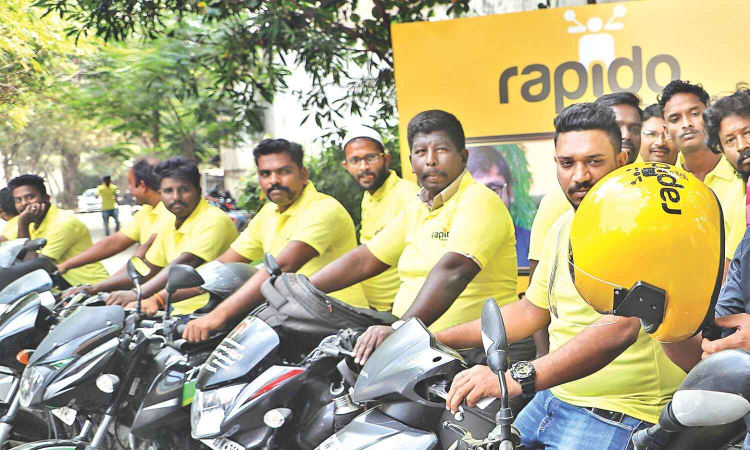Centre clears bike taxis citing last mile connect
Aggregator guidelines 2025 permit shared mobility in a relief for operators; states to take the final call

Representative Image
CHENNAI: The Centre has cleared the decks for bike taxis by allowing state governments to permit non-transport (private) motorcycles to carry passengers through aggregator platforms. The move comes under the newly released Motor Vehicle Aggregator Guidelines, 2025 and marks the first time private registered two-wheelers have been considered for commercial ride services.
The decision comes even as auto and cab driver associations in Tamil Nadu continue to push for a ban on bike taxis, citing safety and livelihood concerns. Karnataka has already banned the service.
The guidelines, issued by the Ministry of Road Transport and Highways (MoRTH), aim to set a uniform regulatory framework for aggregators like Ola, Uber, and Rapido. Replacing the 2020 version, the new policy reflects the growing demand for flexible and affordable last-mile connectivity.
Under Clause 23, state governments can decide whether to allow private bikes to be used for passenger services. Aggregators can be charged a daily, weekly or fortnightly authorisation fee for onboarding such vehicles. The Centre hopes the move will reduce traffic congestion, lower emissions, and boost self-employment.
"Legalising bike taxis is like playing with people's lives. Two-wheelers account for over 50% of road accident fatalities. The government must withdraw the decision," said Kasi Viswanathan, president of the AITUC-backed Tamil Nadu Auto Thozhilalar Sammelanam. He said they have consistently demanded a ban, not only to protect the livelihood of auto drivers, but also due to the risks posed to passengers.
S Hussain, a commuter from Kolathur, said he welcomes the Centre's decision to legalise bike taxi operation as it offers a cheaper mode of transport compared to autorickshaws and cabs. "I prefer bike taxis to travel from my home to Villivakkam railway station and vice versa daily as it is cheaper and reliable," he said.
The new norms also lay down fare regulations. State governments will fix base fares for each vehicle category. Aggregators will be allowed to charge up to 50% less and up to twice the base fare under dynamic pricing. A minimum fare equivalent to three kilometres will apply to cover dead mileage — the distance a driver travels to pick up a passenger.
If a state has not fixed fares for a category, aggregators can propose provisional fares, subject to government approval. Passengers cannot be charged for dead mileage, unless the ride is under three kilometres.
K Santhosh, a daily commuter, said it has become routine for app-based drivers to demand Rs 20–30 extra during the day and up to Rs 100 at night. "I preferred apps to avoid haggling with street autos, but now even apps are pushing these extra charges, " he said.
‘Passengers will be fleeced if pvt aggregators allowed to fix fares’
Drivers must get at least 80% of the fare if they own the vehicle. For aggregator-owned vehicles, drivers must receive a minimum of 60%. The remaining share can be retained by the aggregator. Payment terms must be clearly spelt out in agreements and settled either daily, weekly, or fortnightly.
Jahir Hussain, general secretary of the Urimai Kural cab drivers' union, opposed the Centre's move. "While the Centre is planning a zero-commission cooperative service like 'Sahkar', MoRTH has allowed private apps to take 20% commission. It's unacceptable, " he said. He also called the peak-hour surge pricing, twice the base fare, "legalised fleecing". "We've been demanding aggregator rules since 2019. The state keeps saying the draft is pending, but nothing moves, " he added.
S Balasubramaniam, CITU leader and coordinator of the All Auto Rickshaw Drivers Trade Unions, said fare control must stay with the government. "If aggregators are allowed to fix fares, passengers will be looted, " he warned. He noted that they have been demanding the state government to revise the auto rickshaw fares which was last revised in 2013 but it was not fulfilled.
To improve safety and service quality, aggregators must conduct police verification of drivers, offer a 40-hour training programme, and arrange annual refresher sessions. They must also operate 24x7 control rooms and call centres for monitoring trips and resolving complaints.
Aggregator apps must support English, Hindi and the local language, include panic buttons, identity verification and real-time location tracking. Cybersecurity certification from a CERT-In-recognised agency is also mandatory.
The Centre has also asked States to push aggregators towards electric and alternative-fuel vehicles. A fixed number of disabled-friendly vehicles must be part of each fleet, with targets to be decided by the respective States.
States have three months to adopt the new guidelines.
Sources in the Transport Commissionerate said a draft policy on aggregator rules and fare structure for taxis and autos had already been sent to the State government. "It is up to the government to implement it. The new Centre guidelines will also be reviewed and changes made if necessary, " an official said.



